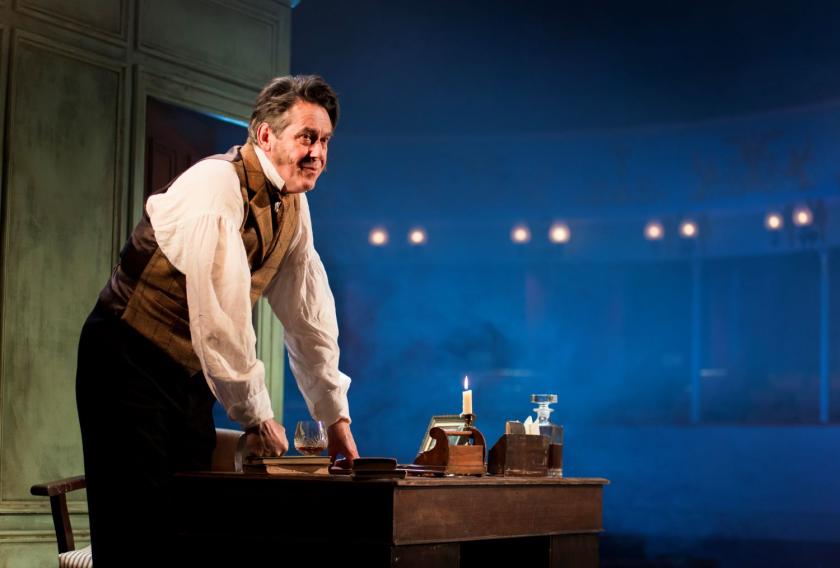It wasn’t Jane Austen’s subtlest move, naming her roguish soldier George Wickham. As countless GCSE English teachers have patiently read in generations of essays, his surname sounds a lot like "wicked" – and wicked he is. Adrian Lukis, who played him in Andrew Davies’ 1995 TV adaptation of Pride and Prejudice, reprises the role in the perfectly pleasant Being Mr Wickham, livestreamed this past weekend from the Theatre Royal, Bury St Edmunds by the Original Theatre Company. It’s Wickham’s less-than-successful attempt to clear his name of the mud Austen dragged it through in her novel.
Lukis co-wrote the show with historian Catherine Curzon; it was first performed at the 2019 Jane Austen Festival in Bath, and is set to go on a real-life tour in October, no doubt delighting multitudes of grandparents. We join Wicked Mr Wickham at the tail end of his 60th birthday, astonished to find himself at this grand old age. His wife Lydia (somehow that fact is still true) is angry with him, but not through any fault of his own, of course; Mrs Pope was the one making eyes at him. This apologia grows into an hour-long mix of past and present: Wickham’s childhood, and his side of the story of Pride and Prejudice, then his current views on – well, himself, mostly. A one-man show is, fundamentally, an ego trip, but Lukis’s charm (not to mention his line-learning ability) is polished enough to pull it off. Under Guy Unsworth’s direction, the cameras dance around him entranced, like guests at a Regency Ball.  Lukis is a master storyteller – it’s the writing he’s not so hot on. Not content with Austen, he and Curzon have raided the bookshelves of their nearest English undergraduate. Byron, Shelley, Thomas Love Peacock – the shared gender of the poets Wickham quotes when he doesn’t know what else to say shouldn’t go unmentioned. “Never say that history doesn’t repeat itself!” he brays triumphantly, commenting on how much the meeting (spoiler alert) of his and Darcy’s sons resembled their own introduction, many years before. The trouble is, nobody says history doesn’t repeat itself. That’s the whole point.
Lukis is a master storyteller – it’s the writing he’s not so hot on. Not content with Austen, he and Curzon have raided the bookshelves of their nearest English undergraduate. Byron, Shelley, Thomas Love Peacock – the shared gender of the poets Wickham quotes when he doesn’t know what else to say shouldn’t go unmentioned. “Never say that history doesn’t repeat itself!” he brays triumphantly, commenting on how much the meeting (spoiler alert) of his and Darcy’s sons resembled their own introduction, many years before. The trouble is, nobody says history doesn’t repeat itself. That’s the whole point.
The issue is that Wickham just isn’t likeable enough, which isn’t really the fault of Lukis and Curzon. Austen made his faults more interesting than those of, say, Mr Collins, but they’re still there; the undercurrent of real, actual danger in the episode where the Bennets learn about Lydia eloping with Wickham can’t be ignored, and neither can Wickham’s history with Darcy’s sister Georgiana. When Wickham goes through the roll call of Pride and Prejudice characters, rather half-heartedly relating what’s happened to them in the past 40 years, Georgiana’s future is conspicuously absent. She’s not mentioned at all until relatively late on, even though Lukis begins with Wickham’s childhood at Pemberley. Wickham’s mother, too, is missing; we are encouraged to believe his father reproduced asexually, which is jolly clever of him.
Wickham is not the villain of Pride and Prejudice because he likes a drink, or because he’s lower down the social scale than Darcy (though the correlation should be noted), or because he flirts with people to whom he isn’t married. He’s the villain because he sexually abuses women, many of whom are significantly younger. It’s hinted that this might be due to injustices wrought against him when he was a child: dalliances with servants appear early in his teenage years, closely followed by brutal beatings from a tyrannical headmaster. But if this is an attempt to save poor old Wickham from that nasty Jane Austen, it misses the mark for the simple reason that Being Mr Wickham is fundamentally uncontroversial. After the excitement of youth, everything returns to normal; Darcy and Wickham are now civil enough to visit each other at home. “Our wives set to work, smoothing ruffled feathers,” Lukis explains, twinkling. Everything Wickham does is forgiven, without his having to lift a finger. That’s why he’s the villain.
- Being Mr Wickham is touring from October
- Read more theatre reviews on theartsdesk















Add comment